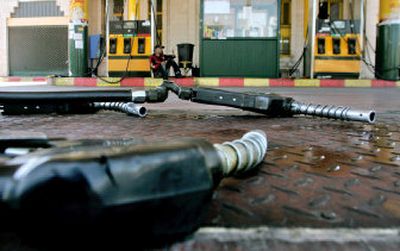Palestinians’ gas supply cut off

NABLUS, West Bank – Palestinian gas stations started shutting down and motorists lined up at pumps after an Israeli fuel company cut off deliveries Wednesday, deepening the humanitarian crisis following Hamas’ rise to power.
An end to fuel supplies for the West Bank and Gaza could cripple hospitals, halt food deliveries and keep people home from work – a devastating scenario for an economy already ravaged by Israeli and international sanctions.
The Israeli company Dor Energy, the sole fuel provider to the Palestinians since interim peace agreements in the mid-1990s, cited growing debts for its decision, Palestinian officials said. Dor declined comment, but the company had threatened to cut off supplies twice before this year, only to be paid at the last minute by the Palestinians.
Asaf Shariv, a spokesman for Prime Minister Ehud Olmert, said Israel would “absolutely not” bail out the Palestinians. Shariv said that since the Palestinian government resells gasoline to consumers, there is no reason for it not to have money to pay its debts.
Mujahid Salame, head of the Palestinian petrol authority, predicted fuel supplies would run out in many areas by today. “If this happens, there will be a humanitarian crisis,” he said.
In Gaza City, people tried to stock up at filling stations.
Station owners said they have several days of reserves, but some limited motorists’ purchases to conserve supplies.
In the West Bank, the situation was more dire. Many stations said they were out of fuel, some laying their dry nozzles on the ground.
“The only thing I’ve been doing for the past day is telling drivers that I don’t have any gas,” said Awad Dabous, who works at a station in the town of Jenin. A sign said simply: “Sorry, no gas.”
The fuel crunch is the latest sign of trouble for the Palestinian economy, hit hard by a cutoff in Western aid. Donors halted the money flow in response to Hamas’ victory in legislative elections, demanding the group renounce violence and recognize Israel. The U.S. and European Union, the two biggest donors, consider Hamas a terrorist group.
Fearing catastrophe, the Quartet of Mideast peacemakers – the U.S., EU, United Nations and Russia – agreed Tuesday to restore some humanitarian aid to the Palestinians, as long as the money is not handled by Hamas. But it remains unclear how much money will be coming and when, and who will administer it.